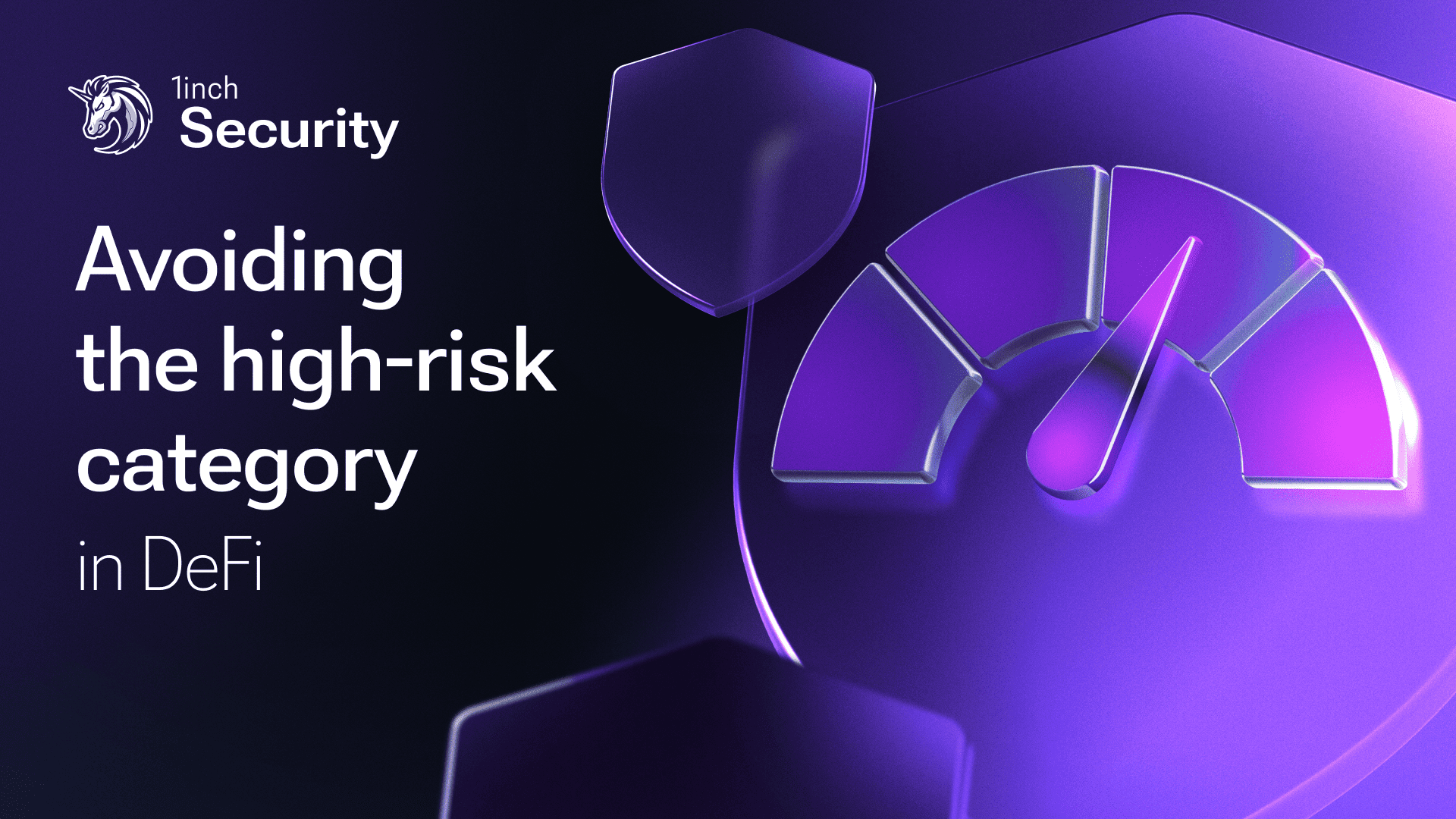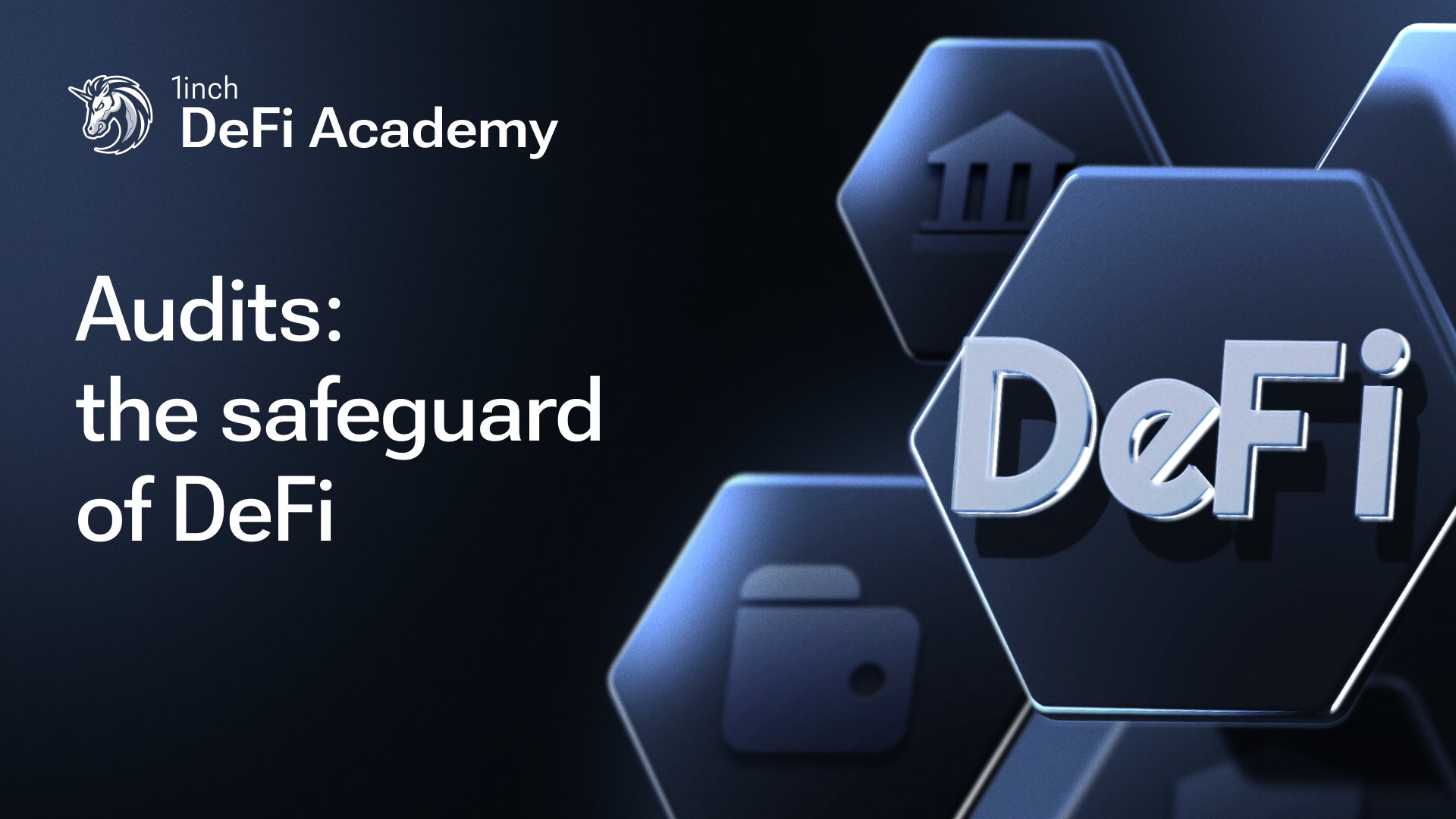Avoiding the high-risk category in DeFi

This article explains what can be done to reduce the chance of being classified as “high-risk.”
For 1inch, security is not just another feature, it’s central to our commitment to fostering trust and confidence in decentralized finance. As a self-custodial platform, 1inch empowers users to fully control their assets while offering protection against manipulation, fraud, and other threats. In this article, we’ll explore practical tips and precautions users can take to protect their wallets from being flagged as high-risk—and to stay safe while navigating the DeFi ecosystem.
Decentralized finance (DeFi) allows users to control their own assets and interact directly on-chain without intermediaries. While this offers great flexibility and freedom, it also comes with responsibilities. Poor decisions or unintended interactions with high-risk actors can lead to your wallet being flagged, impacting your access to platforms like 1inch. This article will help you understand how to navigate DeFi more safely.
"Having spent countless hours investigating risk flags and wallet behavior, I’ve seen how fast reputations can be impacted—even by accidental interactions,” says Ignacio Milito Bianchi, security specialist at 1inch. “Our goal with this article is to empower users to act proactively. Risk management in DeFi isn’t just about protecting funds—it’s about protecting your ability to access the ecosystem at all."
Why wallets get flagged
As part of global efforts to uphold compliance with international regulations and financial crime prevention standards, blockchain transactions are increasingly monitored for risk indicators. Regulatory bodies such as the Financial Action Task Force (FATF) recommend that the crypto industry identify and assess potential red flags associated with wallets and transactions. These may include:
- Transfers involving sanctioned entities or jurisdictions
- Interactions with anonymizing services such as mixers or privacy-enhancing tools
- Activity linked to known scams, fraud schemes, or illicit operations
- Use of high-risk or unregulated exchanges
- Unusual transaction patterns that may indicate money laundering or obfuscation attempts
These indicators are used across the industry to help assess potential risk exposure. Users should be aware that if their wallet interacts with one of these flagged entities—even indirectly—it may be classified as a risk, which can lead to restrictions or denial of service on DeFi platforms.
Important: Even a small transaction involving a flagged address can affect the reputation of your wallet.
Common risk scenarios
- Paying a vendor who uses a CEX tied to sanctioned jurisdictions
- Using bridges or mixers that obfuscate transactions
- Receiving funds from unverified, compromised or illicit sources
- Interacting with unverified wallets involved in phishing, rug pulls, or scams
Even if your intent is legitimate, association with high-risk wallets can taint your address.
Practical tips to stay safe
- Do basic counterparty checks
- Before sending funds, ask the recipient what self-hosted wallet or a CEX they are using.
- Google the exchange or wallet provider to see if it is under any sanctions or red flags.
- Look for news coverage or compliance warnings.
- Use wallets with security features
- Take advantage of security measures in 1inch Wallet and other reputable Web3 wallets—such as dApp scanning, transaction simulations and validation, and malicious token detection.
- Avoid browser extensions or mobile wallets that don’t show transaction simulations or approvals.
- Use tools to check risk exposure
- Etherscan: See address labels and transaction history (look for widgets or browser extensions that enhance readability)
- MetaSleuth: Visual investigation tool with drag-and-drop interface for tracking fund flows and wallet connections
- Cielo: Offers risk scoring, alerts and wallet monitoring with a clean, intuitive dashboard — especially helpful for non-technical users
- Avoid questionable services
- Don’t use services that promise anonymity, unrealistic returns, or security bypasses.
- Be cautious with airdrops or faucets—some have been known to distribute tainted tokens.
- Segment your wallets
- Use separate wallets for personal activity and company-related transactions to avoid cross-contamination.
- Create dedicated wallets for DeFi testing, trading, and long-term holding.
- Practice good operational security (OpSec)
- Keep seed phrases offline.
- Avoid connecting your main wallet to unknown dApps.
- Use hardware wallets for funds you want to protect long-term.
- Report suspicious activity
- If you notice anything unusual or believe your wallet has been compromised, please submit a police report to your local authorities and report the incident to us at compliance@1inch.io or legal@1inch.io.
To help address the issue more efficiently, we encourage you to include the following information in your report:
- The wallet address involved
- A clear description of the issue, including any relevant screenshots or a link to the suspicious transaction (e.g., on Etherscan)
- The date and time you first noticed the issue
- Any actions you've taken since the incident (e.g., revoking approvals, transferring funds)
Expert tip: When in doubt, run a small test transaction to a clean wallet and check if the receiving address shows any risk flags in a tool like MethaSleuth. This can help you avoid inadvertently tainting your main wallet.
"My personal advice is simple: treat every interaction in DeFi as a visible transaction, because it is,” says Ignacio. “Blockchain doesn’t forget, and neither do the tools monitoring it. While most users focus on securing their funds, I always emphasize protecting your wallet's reputation. It's what keeps you connected to the ecosystem. Proactive habits go a long way in preserving your access and avoiding future headaches."
The freedom of self-custody comes with the responsibility to protect your wallet’s reputation. Staying informed and cautious with every transaction helps you avoid being flagged and ensures continued access to DeFi platforms like 1inch.
In an evolving regulatory environment, understanding how your wallet activity is perceived is essential. Think of your wallet like your credit score—once tainted, it can be difficult to recover access and credibility in the ecosystem.
For questions or concerns, reach out to compliance@1inch.io or legal@1inch.io.




























